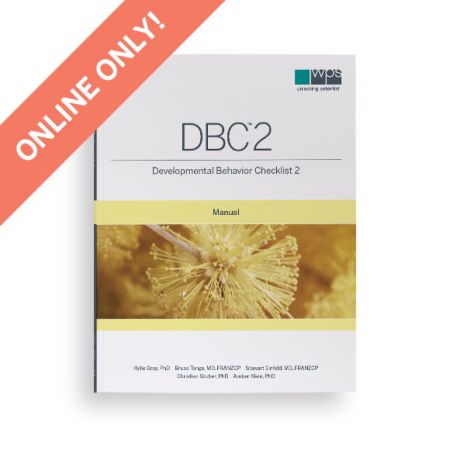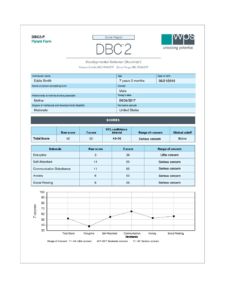
Developmental Behavior Checklist 2 dbc2
Authors: Kylie Gray, PhD, Bruce Tonge, MD, FRANZCP, Stewart Einfeld, MD, FRANZCP, Christian Gruber, PhD, and Amber Klein, PhD
Norms: Provided by degree of intellectual/developmental disability (i.e., mild, moderate, severe, profound); option of using scores based on U.S. or Australian reference samples
Scores: T-scores for Total score and five subscales
Format: Rating scale
Admin Time: Less than 20 minutes
Ages: 4 to 18 years for parent and teacher forms; 18 years and up for adult form
Benefit: Describes emotional and behavioral problems; designed specifically for children and adults with intellectual and/or developmental disability
Published: 2018
Administration: Online via WPS Online Evaluation System
Online Forms, Reports, Kits & e-Manuals
Click to browse products
DBC2 Online Adult Form (10 Uses)
DBC2 Online Adult Form (25 Uses)
DBC2 Online Adult Form (5 Uses)
DBC2 Online Adult Kit
DBC2 Online Child Kit
DBC2 Online Manual
DBC2 Online Parent Form (10 Uses)
DBC2 Online Parent Form (25 Uses)
DBC2 Online Parent Form (5 Uses)
DBC2 Online Teacher Form (10 Uses)
DBC2 Online Teacher Form (25 Uses)
DBC2 Online Teacher Form (5 Uses)
Sample Reports
The DBC 2 is a revised version of the DBC, an instrument that has been in wide international use for over 20 years, and it can be completed by a parent, teacher, or other adult. Unlike other rating scales of emotional and behavioural problems, the DBC 2 is focused on difficulties most likely to be a problem in the intellectually and developmentally disabled population. Scores are based on this population, allowing for a more accurate depiction of behaviour.
The DBC 2 consists of three forms: Parent, Teacher, and Adult. The DBC 2 yields a Total Score and five subscale scores which can be used for clinical, educational, or research purposes. T‐scores can be interpreted based on the range of concern in which they fall. Additionally, the Total T‐score can be compared with a clinical cutoff.




